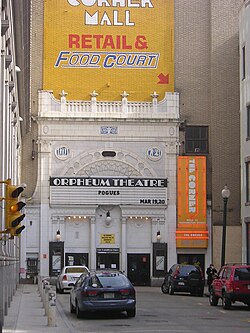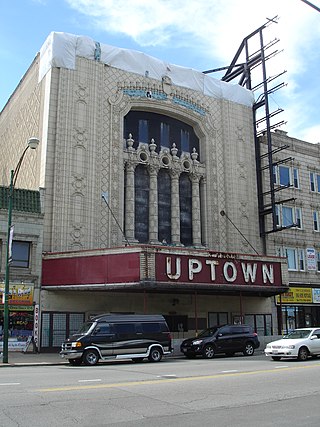
A movie palace is any of the large, elaborately decorated movie theaters built between the 1910s and the 1940s. The late 1920s saw the peak of the movie palace, with hundreds opening every year between 1925 and 1930. With the advent of television, movie attendance dropped, while the rising popularity of large multiplex chains in the 1980s and 1990s signaled the obsolescence of single-screen theaters. Many movie palaces were razed or converted into multiple-screen venues or performing arts centers, though some have undergone restoration and reopened to the public as historic buildings.
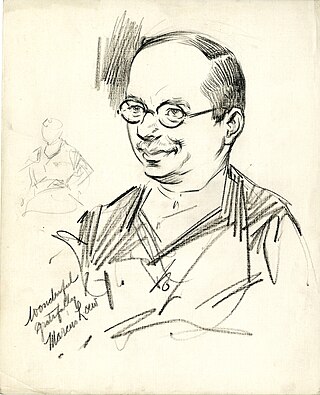
Marcus Loew was an American business magnate and a pioneer of the motion picture industry who formed Loew's Theatres and the Metro-Goldwyn-Mayer film studio (MGM).
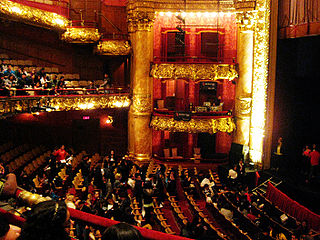
The Colonial Theatre in Boston, Massachusetts, opened in 1900, is the oldest continually-operating theatre in the city. It is located at 106 Boylston Street on Boston Common at the former site of the Boston Public Library. It is a pending Boston Landmark.

The Xfinity Center is an outdoor amphitheatre located in Mansfield, Massachusetts. The venue opened during the summer of 1986 with a capacity of 12,000. It was expanded after 2000 to 19,900; 7,000 reserved seats, 7,000 lawn seats and 5,900 general admission seats. The season for the venue is typically from mid May until late September. In 2010, it was named Top Grossing Amphitheater by Billboard. It mainly hosts concerts; other events, such as graduation ceremonies, including that of Mansfield High School, occasionally take place.
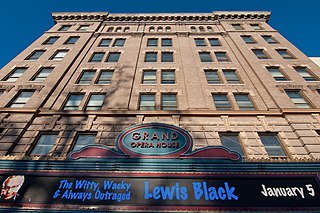
The Grand Opera House, often called The Grand and originally known as the Academy of Music, is a historic opera house located in Macon, Georgia, United States. Listed on the National Register of Historic Places in 1970, it is now the performing arts center of Mercer University.
The Cultural District is a fourteen-square-block area in Downtown Pittsburgh bordered by the Allegheny River on the north, Tenth Street on the east, Stanwix Street on the west, and Liberty Avenue on the south.

Heinz Hall is a performing arts center and concert hall located at 600 Penn Avenue in the Cultural District of Pittsburgh, Pennsylvania. Home to the Pittsburgh Symphony Orchestra (PSO) and the Pittsburgh Youth Symphony Orchestra, the 2,676 seat hall presents about 200 performances each year. Originally built in 1927 as Loew's Penn Theatre, the former movie palace was renovated and reopened as Heinz Hall in 1971.

The Boston Music Hall was a concert hall located on Winter Street in Boston, Massachusetts, with an additional entrance on Hamilton Place.

The Somerville Theatre is an independent movie theater and concert venue in the Davis Square neighborhood of Somerville, Massachusetts, United States. Over one hundred years old, the Somerville Theatre started off as a vaudeville house and movie theater. The theater has since transitioned and now operates as a live music venue and first-run movie theater. As a music venue, the theater has played host to many historic concerts, including the first of the two Last Dispatch concerts, two shows by Bruce Springsteen in 2003, and a performance by U2 in 2009. Recent live performances have included Ryan Adams & the Cardinals, Cursive, Norah Jones, The Jonas Brothers, Joan Baez, and the John Butler Trio.
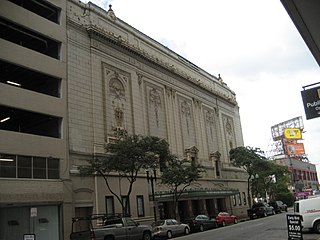
The Orpheum Theater is a theater in the Central Business District of New Orleans, Louisiana.

An atmospheric theatre is a type of movie palace design which was popular in the late 1920s. Atmospheric theatres were designed and decorated to evoke the feeling of a particular time and place for patrons, through the use of projectors, architectural elements and ornamentation that evoked a sense of being outdoors. This was intended to make the patron a more active participant in the setting.

Miller Symphony Hall is a 1,100-seat performing arts facility in Allentown, Pennsylvania that hosts the Allentown Symphony Orchestra. The hall was previously known as Central Market (1896), Lyric Theater (1899), and Allentown Symphony Hall (1959). In 2012, it was renamed for the Miller family, longtime owners of the hall and of The Morning Call newspaper.

The Paradise Rock Club is a 933-capacity music venue in Boston, Massachusetts. Due to its relatively small size, it appeals to top local alternative rock performers as well as American and British bands visiting Boston for the first time. The venue accommodates small music festivals and non music related events. The Paradise is located on the edge of Boston University's campus and draws a student-based crowd. Most shows have an age requirement of eighteen or older.
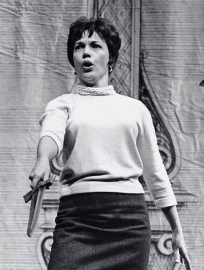
Beverly Wolff was an American mezzo-soprano who had an active career in concerts and operas from the early 1950s to the early 1980s. She performed a broad repertoire which encompassed operatic and concert works in many languages and from a variety of musical periods. She was a champion of new works, notably premiering compositions by Leonard Bernstein, Gian Carlo Menotti, Douglas Moore, and Ned Rorem among other American composers. She also performed in a number of rarely heard baroque operas by George Frideric Handel with the New York City Opera (NYCO), the Handel Society of New York, and at the Kennedy Center Handel Festivals.

The Orpheum Theatre, also known as New Orpheum Theatre and Orpheum Electric Building, is a performing arts center located at 528 S. Pierce Street in Sioux City, Iowa. Built in 1927 as a vaudeville and movie palace, the theatre was restored in 1999 and today is the home of the Sioux City Symphony Orchestra.

The Boston Opera House, also known as the Citizens Bank Opera House, is a performing arts and esports venue located at 539 Washington St. in Boston, Massachusetts. It was originally built as the B.F. Keith Memorial Theatre, a movie palace in the Keith-Albee chain. The chain became part of RKO when it was established just before the theater opened on October 29, 1928, and it was also known as the RKO Keith's Theater. After operating for more than 50 years as a movie theater, it was rededicated in 1980 as a home for the Opera Company of Boston, which performed there until the opera company closed down in 1990 due to financial problems. The theater was reopened in 2004 after a major restoration, and it currently serves as the home of the Boston Ballet and also hosts touring Broadway shows.

The Boston Theater District is the center of Boston's theater scene. Many of its theaters are on Washington Street, Tremont Street, Boylston Street, and Huntington Avenue.
The Vaudeville Managers Association (VMA) was a cartel of managers of American vaudeville theaters established in 1900, dominated by the Boston-based Keith-Albee chain. Soon afterwards the Western Vaudeville Managers Association (WVMA) was formed as a cartel of theater owners in Chicago and the west, dominated by the Orpheum Circuit. Although rivals, the two organizations collaborated in booking acts and dealing with the performers' union, the White Rats. By 1913 Edward Franklin Albee II had effective control over both the VMA and WVMA. In the 1920s vaudeville went into decline, unable to compete with film. In 1927 the Keith-Albee and Orpheum chains merged. The next year they became part of RKO Pictures.
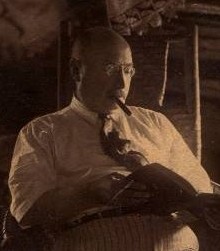
Percy Garnett Williams was an American actor who became a travelling medicine salesman, real estate investor, amusement park operator and vaudeville theater owner and manager. He ran the Greater New York Circuit of first-class venues. Williams was known for giving generous pay and good working conditions to performers. At his death, he endowed his Long Island house as a retirement home for aged and destitute actors.
Markella Hatziano is an operatic mezzo-soprano born in Athens, Greece.
